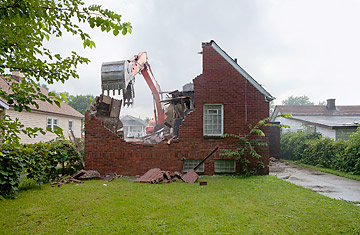
A home being destroyed in the Lee-Miles area of Cleveland
If you close your eyes and try to imagine Middle America, you might picture Lakewood, Ohio, a working-class suburb of Cleveland whose orderly residential streets, tidy houses with postage-stamp lawns and median household income of $44,000 are the very foundation of the American Century. With good public schools, an economically diverse population, multiple parks and 33 churches, it's been home to generations of families in the Cleveland area. "It's got it all," says Jacob Stoll, 35, who grew up on the Lake Erie shoreline and runs the family insurance business on Lakewood Avenue.
Now cut to a 30-ton yellow excavator tearing down those homes. Neighbors come out to watch the spectacle as dilapidated row houses and elegant turn-of-the-century Victorians collapse in plumes of dust. It's an increasingly common scene since local authorities began acquiring foreclosed properties 20 months ago. Wreckers paid by county and municipal officials have taken down 12 of Lakewood's homes, another 11 will be demolished in the coming months, and more are on the way out. A thousand of Lakewood's 12,000 one- and two-family homes are in some kind of financial distress, with 600 of them delinquent on their taxes, 200 sitting vacant and another 200 in foreclosure.
To hear Lakewood's mayor, Mike Summers, tell it, the demolitions are a good thing. "We're not gonna miss these houses," Summers, 57, said in mid-August after taking the controls of a wrecker to splinter the lath-and-plaster walls of a single-family home at 1549 Lakewood Avenue, across the street from Stoll's house. Beginning in the mid-1990s, 1549 Lakewood flipped from one absentee landlord to another as mortgage bundlers packaged it with other properties and sold them to investors. Lakewood officials have tracked some holders of local mortgages as far afield as Pakistan. After the 2008 housing collapse, 1549 Lakewood became a criminal-nuisance property. "The place was falling apart," Summers said.
But Lakewood's demolition derby is about something bigger than nuisance properties: it's an attempt to save the town's economy as a whole. Like the rest of the country, Lakewood is still struggling to recover from the shock of the 2008 collapse. With a 6% drop in tax revenue, a $3 million drop in state funds and an 8.3% unemployment rate, the town needs to find a new way out. Razing houses, officials say, will increase competition for the remaining homes, driving up real estate values. That, in turn, will make it easier for homeowners to refinance to cheaper loans, freeing up spending and boosting consumer confidence. "It's a matter of supply and demand," says Dennis Roberts of the Cuyahoga Land Reutilization Corp., a quasi-government-controlled nonprofit, or land bank, that is overseeing the destruction of more than 645 homes in and around Cleveland.
Partly destroying a city to save it would have been unthinkable just a few years ago. But across the country, economists and politicians are embracing increasingly radical ideas as a seemingly obvious fact gains consensus. America can't get out of its economic doldrums until it fixes the problem that caused the crisis in the first place: housing. "The recovery will never turn into an expansion that we are comfortable with until housing has turned," says Mark Zandi, chief economist for Moody's Analytics.
